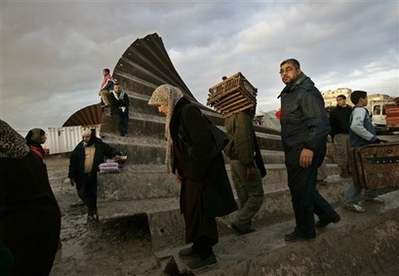Bordercrats Against Joy and Plenty


The Gaza strip is surrounded on every side either by the sea, or by a border wall erected and guarded by the military forces of the Israeli and Egyptian governments. The one and a half million people locked down in this tiny strip of sand have suffered grinding poverty and cultural deprivation, as a direct result of the extreme difficulty, or, for the past seven months, the complete impossibility, for peaceful workers or merchants to make their way over the government-created borders within which they are imprisoned, or to ply their trades in either Israel or Egypt. The walled-off border-crossing into Egypt has been repeatedly closed off for indefinite periods of time at the discretion of the Israeli government, and now has been locked down completely since June 2007. Last week, Palestinian militants, probably with the backing of Hamas, blew a hole in the wall near the Rafah Border Crossing in the middle of the night. Here’s what happened the next morning:
RAFAH, Gaza Strip – On foot, in cars and in donkey carts, tens of thousands of Gazans flooded into Egypt on Wednesday through a border fence blown up by militants — puncturing a gaping hole in Israel’s airtight closure of the Gaza Strip and giving a boost to Hamas.
In a shopping spree that was both festive and frenzied, Gazans cleared out stores in an Egyptian border town, buying up everything from TV sets to soft drinks to cigarettes.
… For ordinary Gazans, it was a day of joy and plenty.
Osama Hassan, 25, said the border opening will enable him to marry his 17-year-old fiancee next week, because they were able to get items they need to set up a household. He bought a special mattress for his injured back and she assembled kitchen supplies.
…
Freedom is good. We need no border after today,said Mohammed Abu Ghazal, a 29-year-old out-of-work Gazan.Children bought soft drinks and chocolate, women scooped up cheese and cleaning products, and men stocked up on cigarettes — all expensive or simply unavailable in Gaza because of Israel’s shutdown of cargo crossings.
Other Palestinians staggered over toppled metal plates that once made up the border fence, carrying TV sets, cell phones, tires and plastic bottles filled with fuel. Some brought in goats and chickens.
Four Palestinians in wheelchairs were pushed over the border, where ambulances picked them up for treatment in Egypt. At one point, a dozen people crowded around a motorcycle to lift it over a low border wall in Egypt.
… After news of the breach spread, people across Gaza boarded buses and piled into rickety pickup trucks heading for Egypt. It was a rare chance to escape Gaza’s isolation.
Moussa Zuroub, 28, carried his young daughter, Aseel, on his shoulders through the muddy streets of Rafah, which is divided by a wall into Egyptian and Gazan segments.
I’m coming just to break that ice — that all my life, I’d never left Gaza before,he said.By nightfall, more than 1,000 Gazans reached El-Arish, an Egyptian town about 37 miles south of Rafah, walking the streets and shopping in stores that stayed open late.
… The chaotic scenes came almost a week after Israel imposed a tight closure on Gaza, backed by Egypt, in response to a spike in Gaza rocket attacks on Israeli towns. On Tuesday, Israel eased the blockade slightly, transferring fuel to restart Gaza’s only power plant.
But true relief came with the toppling of the wall. Egyptian shopkeepers took advantage of the surge in customers, swiftly raising prices of milk, taxi rides and cigarettes. Shops quickly ran out of most of their goods.
In Gaza City, the price of cigarettes, which had skyrocketed during the closure, started to drop. Local money changers began charging extra to change Israeli shekels into dollars, as Gazans were using the U.S. currency in Egypt.
Crowds waited along roads in Gaza City, trying to catch rides to the border. Taxi driver Mahmoud Abu Ouda made one trip to Rafah, but stopped because he had no more fuel.
The city is empty of cabs. They are all in Rafah,he said.— Ibrahim Barzak, Associated Press (2008-01-23): Gazans flood Egypt after border breach
Meanwhile, here’s the official reaction
— which is the dignified term that the press uses to describe the ranting power-trips of a tiny, parasitic minority sitting in comfortable government offices far away from the millions of people upon whose lives and livelihoods they constantly render their sanctimonious opinions and summary judgments — to thousands of desperate people suddenly having a momentary taste of joy and freedom:
Official reaction to the day’s events ranged from dismay to embarrassment to outright anger.
The United States expressed concern about the border breach. Israel demanded that Egypt take control of its border. Hamas called on its rivals to help come up with new arrangements for Gaza’s crossings.
Egypt’s leader said he had no choice but to let in the beleaguered Palestinians. But Arab and U.S. officials in Washington said the Egyptian government assured the United States the border would be closed quickly.
…
We are concerned about that situation and frankly I know the Egyptians are as well,State Department deputy spokesman Tom Casey said.… An Arab diplomat in Washington said Egypt indicated to the U.S. that the flow of people would end by midday Thursday and pledged to rebuild the smashed barrier. A senior U.S. official, however, said Egypt was not specific on when the border would be closed but promised the situation would not continue for long.
They will make an effort first to contain the crowd on their side of the border so they don’t go anywhere, and then coax people back. We’ll see tomorrow how that has worked,said the official, who like the Arab diplomat, insisted on not being quoted by name in return for describing the conversations between the two governments.— Ibrahim Barzak, Associated Press (2008-01-23): Gazans flood Egypt after border breach
Please note that in the minds of the bellowing blowhard lords of the world, assembled under the banner of Peace Through International Apartheid,
the free and jubilant movement of hundreds of thousands of ordinary people, their ability to, for once, get enough food and seek healthcare and even get a few minor luxuries and pleasures like chocolate for their children or cigarettes–and, for once, to trade with equals for the things they want, rather than being forced to take hand-outs from the all-pervasive U.N. relief agencies and NGOs that provide minimal relief in Gaza’s permanent state of emergency–is chaos
that a government needs to take control of,
a situation
to be defused, a breach
to be repaired–in short, a violation of sanctified bordercrat prerogatives which provokes concern
and demands a prompt solution
–which, in the mind of the Commissar, means a gang of armed men coaxing
and corralling thousands of happily freed people back into their pens, and rebuilding the walls that shut them in as quickly as possible. To hell with joy and plenty–there are National Interests and Security Concerns involved.
It should go without saying that I have nothing but contempt for Hamas, the quasi-governmental terrorist force that uses Gaza as a base for exchanging dick-swinging shows of belligerence with the Israeli government, each armed faction playing off the other while their innocent neighbors, both Jewish and Arab, pay for it in death, terror, and ruined livelihoods. But even the most despicable creeps can be the occasion of something good, and I wonder–with fear and trembling–what kind of psychology it could possibly take to look at the Gazan’s jubilee days and see nothing but a menace to be eradicated and a situation
to be coaxed and jostled and hammered back into the status quo ante.
Tear down the walls and bury the stones from which they were made.
(Via Mike Linksvayer 2008-01-27.)
